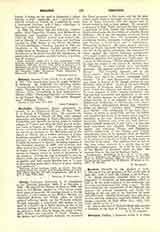

Besoigne, JEROME, a Jansenist writer, b. at Paris, 1686; d. 1763. Ordained in 1715, he received the doctorate of the Sorbonne three years later. He was also assistant principal of the College of Plessis, but his defense of Jansenism and his opposition to the Bull “Unigenitus” obliged him to resign the post. In 1729, the Sorbonne erased him from the list of Doc-tors and, in 1731, he was exiled from Paris. During the following year he was allowed to return. He wrote a “History of the Abbey of Port Royal” (6 vols.), and “Lives of the Four Bishops engaged in the case of Port Royal”. We have also from his pen two works on Scripture: “Concorde des livres de la Sagesse” (Paris, 1737), reprinted in Migne’s “Cursus Completus” (XVIII) and “Morale des Apetres ou concorde des epitres de saint Paul et des epltres canoniques du N. T.” (Paris, 1747).
JOHN CORBETT

